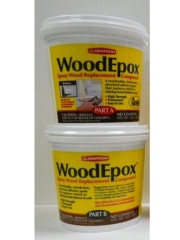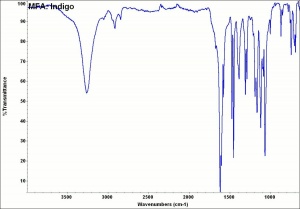WoodEpox
DRAFT - in process of being edited
Description
[Abatron, Kenosha WI] A structural adhesive putty composed 2-part epoxy filled with microballoons. WoodEpox® is a high-strength, no-shrink, lightweight, light-colored compound that can be used in any thickness to fill, replace, and repair wood and other materials. It can be painted, stained, sanded and worked like wood. The working time is 20 minutes. It can be used for structures, floors, windowsills and frames, moldings, moldings, furniture and sculpture. In addition to wood, the product bonds well to ceramics, concrete, metal and glass. According to the manufacturer, WoodEpox® is 100% epoxy and contains no VOCs or water. A companion product, LiquidWood®, may be used for deeper penetration or as a priming layer. WoodEpox® is considered a permanent treatment for wood and cannot be safely removed.
Synonyms and Related Terms
(Use the Slider gallery for all analytical spectra)
Other Properties
WoodEpox® consists of 2 components: resin paste (A) and hardener paste (B). A well-blended mixture of equal proportions A and B will harden in 1-2 hours to form a lightweight, non-shrinking product that is resistant to chemical, water, heat, and weather.
| Product | WoodEpox® mixture |
|---|---|
| Form | 100% solids, 1:1 mixture |
| Tensile Strength | 17.5 Mpa |
| Compressive Strength | 37.9 Mpa |
| Hardness Shore D | 53-55 |
| Elongation | 4% |
Hazards and Safety
WoodEpoxA is composed of a proprietary diglycidyl ether resin mixture with microballoons. The epoxy base material is a white thixotropic paste that is considered a minor skin irritant with low oral toxicity.
Abatron WoodEpoxA: MSDS
WoodEpoxB is composed of a proprietary mixture of amines mixed with microballoons. The curing agent is a tan thixotropic paste with a light ammonia odor. Contact may cause extreme eye irritation and minor skin irritation, including contact dermatitis.
Abatron WoodEpoxB: MSDS
Additional Information
° Abatron : Manufacturer's website
(Include pdf files of tables or related information; new line for each file)
Characteristics of Common Blue Pigments
Additional Images
(The gallery is a repository for all additional images; use a new line for each image)
List of resources checked for the production of this record
(Provide a list of all sources used to generate this record. Make notations if any source provides different values than included in this record. Separate each entry with bullets)

